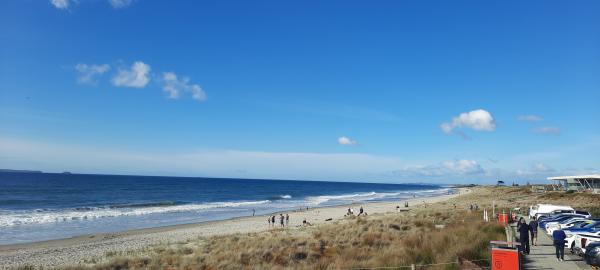《独酌 · 于Papamoa Beach, New Zealand 》
2025-06-20
天气晴朗,微风,公共假期
(Matariki is known as the Māori New Year)
一人一桌酒一盏,
一山一水望无边。
涛声随酒穿肠过,
清风吹魂上云端。
飞鸟落前询我意?
我问飞鸟慕人间?
作品赏析:
这首诗《独酌·于Papamoa Beach》描绘了诗人在Papamoa海滩独饮时的闲适与遐想,语言简洁却意境深远。以下是对该诗的赏析:
诗歌内容
- 前两句“一人一桌酒一盏,一山一水望无边”以“一”字贯穿,突出了独处的宁静与自然的辽阔。诗人独自面对山海,酒与景交融,营造出超然物外的氛围。
- 后两句“涛声随酒穿肠过,清风吹魂上云端”运用通感手法,将涛声与酒、清风与灵魂联系起来,表达了饮酒时的畅快与精神的自由。
- 结尾两句“飞鸟落前询我意?我问飞鸟慕人间?”通过人与飞鸟的互动,引发对人间与自然的思考,增添了哲理性,耐人寻味。
艺术特色
1. 语言简练:全诗多用短句和重复字,如“一人”“一山”,节奏明快,朗朗上口。
2. 意境悠远:诗中“山海”“涛声”“清风”“飞鸟”等意象,共同构成了一幅空灵的画面,传递出诗人与自然对话的悠然心境。
3. 情感真挚:从独饮的闲适到与飞鸟的问答,情感层层递进,既有对自然的陶醉,也有对人生的思索。
背景与情感
诗歌创作于毛利新年(Matariki)的公共假期,天气晴朗,微风轻拂。这一特殊时节为诗作增添了文化意蕴,而诗人的独酌则体现了一种超脱与自省。末句“我问飞鸟慕人间?”或许暗含对尘世生活的留恋,或是对自然与人间关系的探讨。
总结
这首诗以简练的语言和丰富的意象,展现了诗人独处时的精神世界,既有对自然的赞美,也有对生命的感悟。其艺术魅力和哲思使其成为一首值得品味的佳作。
============================
A Solitary Drink · At Papamoa Beach
2025-06-20 · Clear skies, gentle breeze · Public Holiday (Matariki — the Māori New Year)
A Solitary Drink · At Papamoa Beach
One man, one table, a single cup,
One hill, one sea — a boundless view.
With wine, the waves surge through my veins,
The breeze lifts up my soul to clouds.
A bird descends — inquiring into my thoughts?
I smile and ask: do you long for the world of men?
≈========================
Analysis and appreciation of poem 《A Solitary Drink · At Papamoa Beach》, focusing on its structure, imagery, themes, and emotional resonance.
------
1. Structure and Form
The poem consists of six unrhymed lines, with a natural and contemplative rhythm. It does not follow a strict metrical form, but it flows gracefully, employing parallelism, especially in the first two lines, to establish symmetry and balance. The use of dashes and pauses helps shape the meditative tone.
---
2. Imagery and Symbolism
The poem’s strength lies in its minimalist yet vivid imagery:
“One man, one table, a single cup” sets a quiet, solitary scene. The repetition of “one” emphasizes aloneness — not loneliness, but a conscious, peaceful solitude.
“One hill, one sea — a boundless view” expands the scene from the intimate (the self) to the vast (the natural world), suggesting unity between the inner and outer.
“With wine, the waves surge through my veins” blends nature and body, suggesting that the poet is not merely observing but merging with the elements. The wine becomes a medium of communion.
“The breeze lifts up my soul to clouds” evokes transcendence — a lightness of being, an escape from worldly concerns, almost mystical.
“A bird descends — inquiring into my thoughts?” introduces a subtle turn: nature (the bird) becomes not just a backdrop but a mirror or interlocutor, asking about the poet’s inner world.
“I smile, and ask: do you long for the world of men?” reverses the questioning. The poet projects human restlessness onto the bird, suggesting a reflection on attachment, detachment, or perhaps disillusionment with society.
---
3. Themes
a. Solitude and Reflection
The poem celebrates solitude not as isolation, but as a space for introspection, harmony with nature, and spiritual clarity.
b. Human and Nature Integration
By physically and emotionally identifying with the waves, wind, and birds, the poet demonstrates a Taoist-like union with the natural world — reminiscent of Chinese poetic traditions.
c. Questioning the Human World
The final couplet subtly critiques or questions the human condition. The poet’s smile suggests detachment or gentle irony, while the rhetorical question invites readers to reflect on why we stay bound to worldly affairs.
---
4. Tone and Mood
The tone is calm, contemplative, and lightly philosophical. There is no overt drama, but a quiet beauty that emerges from balance, clarity, and internal freedom. The final smile is a soft, almost compassionate gesture — not toward the bird, but toward the self and the world.
---
5. Cultural Resonance
Set on a New Zealand beach during Matariki, the Māori New Year, the poem subtly echoes the idea of renewal, remembrance, and cosmic connection. Though not overtly Māori, the poem’s themes of nature, stars, and spirit align with Matariki’s cultural ethos.
Moreover, the style resonates with Chinese classical poetry, particularly poets like Li Bai or Wang Wei, who often wrote of drinking alone, conversing with birds or the moon, and finding transcendence in nature.
---
Conclusion
This poem, though brief, is rich in layered meaning. Through a simple act — drinking alone on a beach — it touches on universal questions of solitude, connection, and the meaning of human existence. Its beauty lies not in grand statements but in the delicate interweaving of image, thought, and silence.
屏蔽 举报回复

